Vol 1 No. 8 TROPIC LIGHTNING NEWS April 22, 1966
Index
[The 1966 Vietnam issues of Tropic Lightning News were published in Saigon,
and are of lower quality than later years that were printed in Japan. Over
the years the photographs and text have faded and it has been difficult to
reproduce them. Even when the photos are unclear, I have been included
them to give a sense of the activities in the Division.]
Danny Kaye Opens Division Amphitheater
The whistles and cheers of the men of the division echoed through Hau Nghia
Province last week as Danny Kaye, on tour of Vietnam, became the first
entertainer to appear for the Tropic Lightning troops since their arrival at Cu
Chi.
Greeted by Major General Fred C. Weyand, division commander, the Kaye
entourage staged two performances at the newly built division amphitheater.
Kaye, who was accompanied by popular singer Vikki Carr, visited wounded
soldiers at the 25th Medical Battalion's field hospital to take the show to men
unable to attend.
Lunching with the 1st Battalion, 27th Infantry "Wolfhounds", Kaye and the
other performers were entertained with songs of the islands from the men who
were based in Hawaii before being sent to Vietnam. It was, said one soldier,
one way of saying thanks to the performers for going to Cu Chi.
The entertainers were presented with honorary memberships to the division by
General Weyand during their second performance.
Drury Stars Strut Stuff
James Drury, TV's Virginian, currently on tour in South Vietnam, treated more
than 2,000 troops of the 25th Infantry Division to more than an hour of comic
western ballads and dancing "a la GO-GO" this week at the division's new
amphitheater.
Arranged by the Division Special Services Office, the U.S.O. show featured,
in addition to Drury, the South Hollywood Buffalo Hunters and dancers Lori
Bigley and Joni Lyman.
Drury and his troupe were greeted by Major General Fred C. Weyand, division
commander. After the afternoon performance, General Weyand presented the
performers with honorary memberships in the "Tropic Lightning" Division.
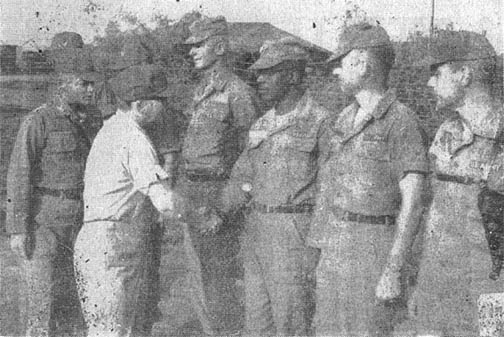 |
Senator John G. Tower (R-Tex.) (in civilian clothes) shakes hands with Major Herbert Evans, commanding officer, 3rd Support Battalion (Provisional), during the senator's visit with 3rd Brigade. Behind the senator is Colonel Everette A. Stoutner, deputy brigade task force commander. |
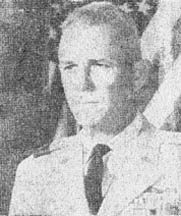 Gen.
Walker Commands Third Brigade
Gen.
Walker Commands Third Brigade
Brigadier General Glenn D. Walker last week became commander of the 3rd
Brigade Task Force in ceremonies at Pleiku.
General Walker, who is also the assistant division commander/maneuver,
assumes command of the task force from Colonel Everette A. Stoutner, who is now
deputy task force commander.
Following a 13-gun salute fired by a battery of 2nd Battalion, 9th Artillery,
Col. Stoutner turned over the brigade colors to General Walker.
After a brief speech to the assembled officers and men of the brigade, the
general was guest of honor at a reception for the officers at the brigade mess.
Two Units Change Command
Lieutenant Colonel Harley F. Mooney, Jr., has assumed command of 1st
Battalion, 27th Infantry, replacing Lieutenant Colonel James H. Cawthra, who has
been reassigned to Headquarters, U.S. Army, Vietnam.
His assignment as commander of the "Wolfhound" unit marks the second time
Col. Mooney has served in Vietnam. He arrived in-country in January with 2nd
Brigade, when he was commanding officer of 2nd Battalion, 27th Infantry.
He was called back to assist in training "Tropic Lightning" soldiers coming
to Vietnam and to recover from a chronic leg ailment.
Before he joined 2/27th last year, Col. Mooney was the assistant division
chief of staff.
Executive officer for 1/27th in Korea, where he suffered a leg wound from
Chinese shrapnel, Col. Mooney served under Major General Fred C. Weyand,
division commander, who was then a unit commander.
Col. Mooney holds the Silver Star, the Bronze Star, with one Oak Leaf
Cluster, and three Purple Hearts for action in Korea.
Col. Davis Greeted By 25th Avn. Bn.
Lieutenant Colonel Edward P. Davis, formerly assigned to Strategy and Tactics
Analysis Group, Bethesda, Md., arrived this week to assume command of 25th
Aviation Battalion.
Colonel Davis, a native of Lexington, Va., and a graduate of Virginia
Military Institute, replaces Major George J. Young, who was acting as interim
commander of the battalion.
During his 17 years in the Army, Col. Davis has received the Army Occupation
Medal, the National Defense Service Medal, the Army Commendation Medal, the Army
Aviation Badge and the Parachutist dodge.
Whither The Weather
The transition from the dry northeast monsoon to the moist southwest monsoon
is expected to be completed by the end of May, according to the May climatic
summary.
May is a wet season month over most of Southeast Asia. Most rainfall is
produced by afternoon and evening showers or thundershowers. The mean number of
days with rain is 17 with an average of 10 inches.
The normal daily maximum temperature during May is 95, with the minimum near
73. The maximum is usually reached between 2 and 4 p.m.
Gen. Heintges Visits Cu Chi
Lieutenant General John A. Heintges, deputy commanding general for the U.S.
Military Assistance Command, Vietnam, visited Cu Chi last week for a short tour
and briefings on the 25th Infantry Division.
He was welcomed to the division's base camp by Major General Fred C. Weyand,
"Tropic Lightning" commander. His tour of the area included visits to Division
Artillery, 3rd Battalion, 13th Artillery, and 69th Armor.
1/8th Tosses 50,000th Round at Viet Cong
Colonel Daniel B. Williams, Division Artillery commander, pulled the lanyard
at 1st Battalion, 8th Artillery this week to send "Automatic Eighth's" 50,000th
round of 105mm howitzer firepower tearing into Viet Cong positions.
The occasion came just five weeks after "Tropic Lightning" artillery had
greeted enemy positions with their 25,000th round and a little over two months
since the first round had belched from the big suns of the division's 2nd
Brigade.
Corporal Terry M. Witherington, of Cochran, Ga., officiated when 8th
Artillery zeroed its first round on enemy positions on January 19. He was on
the job again to send off the battalion's 25,000th round on March 8.
The "Automatic Eighth" has already set many records. On one day, a total of
2,100 rounds were fired by the battalion. One battery alone fired nearly 1,700
rounds in a single day.
Page 2 TROPIC LIGHTNING NEWS April 22, 1966
Understrength Divisions OK: DoD
Some Army stateside divisions are below full combat-ready status, but this is
according to plan, according to a Defense Department Spokesman.
It was recognized that some divisions would have to be used for training once
the decision was made not to call up the Reserves, the spokesman said. "So the
present status is not surprising, but was planned that way."
Divisions mentioned are the 1st and 2nd Armored, 4th Infantry and 5th
Mechanized. Some of these, he said, are expected to reach full combat readiness
status by June.
The spokesman, referring to previously announced figures said another 21
combat-ready divisions could be deployed to Southeast Asia between now and the
end of June, if required.
This could be accomplished, he said, without calling up the Reserves or
National Guard, making 64 combat-ready battalions in Southeast Asia.
In an emergency, the equivalent of nine combat-ready division forces could be
ready for deployment in 90 days, the spokesman said. This could be accomplished
by a Reserve call-up and extending enlistment terms and RVN tours.
"Obviously, we have not called the Reserves and we have requirements for
recruit and draftee training," he concluded. (AFNB)
PACEX Serves Twelve Million Miles
The post exchange, the serviceman's corner store, has evolved from the
homespun operation a la Beetle Bailey into a far-flung, bustling business
spanning 12 million square miles in the Pacific. And it is the Pacific Exchange
System (PACEX) which administers the staggering organization which supplies
grass skirts in Hawaii, Hakata and Sakura dolls in Japan and Hong Kong-produced
brocade in Vietnam.
PACEX, with its nearly 4,000 activities served by 14,000 employees of a dozen
different nationalities, has emblazoned its familiar imprint wherever American
servicemen are: in Japan, Korea, Okinawa, Hawaii, the Philippines, Thailand,
Guam, Vietnam and Hong Kong.
A diverse organization, PACEX hardly limits itself to razor blades, magazines
and candy bars. The Philippines Branch, for instance, operates the only bulk
milk reconstitution plant it the system, while the cab company concessionaire in
Hawaii has been part of PACEX since 1928.
The welcome sight of a white PACEX snack truck in the many places where the
service operates hardly rivals the Korean branch for rolling stock. In the Land
of the Morning Calm, a snackette on the Seoul-Pusan train keeps traveling
servicemen refreshed.
But in a land still undergoing sweeping transition and development, PACEX
has been put to the test to keep fighting men supplied in Vietnam. It is here
that many servicemen get their daily necessities from impromptu PXs set up in
CONEX containers, temporary buildings or native huts pending completion or
renovation of new quarters.
The PACEX motto - "Service to Fighting Men" - means what it says.
AMERICANS OFFER LETTER SUPPORT
One girl asked if it snowed much in Vietnam. A young boy expressed the
minority opinion that Batman is "pretty dumb." And a young lady, 20 years old,
wanted someone to write her because she was "lonely."
in all cases, the letters were simply addressed to "any American soldier in
Vietnam" from an American citizen, and, if nothing more, they all sparkled, with
good cheer and sincerity for those far away.
The avalanche of letters came from all sections of the United States - from
eight-year-old boys to an 82-year-old great grandmother - and the men at Cu Chi
gobbled them up..
The men of 2nd Bde. found Easter cards from the seventh grade class of
Rittenhouse Junior High in Norristown, Pa. They found letters from those
devoutly religious, from those shouting patriotic encouragement, from those who
simply wanted to write a G.I. One even came from a Bronx, N.Y., girl who was
against the administration's policy in Vietnam, but she still wanted to say that
"even those of us who are anti-war haven't forgotten you."
"I'm involved in so many extracurricular and social activities," she wrote,
that I don't even have time for my school work. Tomorrow, I'm cutting school
and going on a protest march to Albany . . . I'm just busy, busy, busy."
Most of the letters begin, "I wish this letter could be a little more
personal but it's hard to write to someone whose name you don't know. I don't
know you and you don't know me. I find it strange to write someone I don't
know..." But most of them end, "Please write."
Among the younger set, school seems to predominate in their thinking.
During the transit strike in New York, one girl, a sophomore at Mater Christi
High School wrote that the parochial high schools have been closed today and
"probably the rest of the week, I hope."
Sherry Campbell, 13, of Richmond, Va., says she's in the seventh grade. "I
hate my English and history teacher. She's so mean I don't know how she can
live with herself. If you see her in the morning before school and say, 'Hi!'
she just gives ya a dirty look. And it's not just me - nobody likes her! Oh
well, so much for her.
Douglas Crawford, 12, of Richmond, W. Va., was proud of American
accomplishments in Vietnam. "I really envy you guys," he wrote, "because you
guys at least get to fight for what you want, but us, we can't fight the school
so we have to go."
Johnathan Watson, 14 1/2, of Gore, Okla., said he'd be doing better in school
if he could keep his mind off girls long enough. Roger Christensen, 11 1/2,
Alden, Minn., was apparently having problems, too. "I am in the sixth grade at
Alden School, hope to go to the seventh this fall."
Sometimes the younger ones write about home life. One 13-year-old has three
sisters and no brothers and he is quite unhappy about it. "About having three
sisters and no brothers," he said, "It was a bad deal but my parents couldn't
help it. I have two girls I like a lot. Last Friday I went to a dance at
school but I got the flu there and had a pretty miserable time."
Another wrote, "My sisters' ages are 15, 10 and two, so that makes it pretty
hard to do my homework. I have just finished watching Batman on T.V. It is
pretty dumb but my sisters like it. Well, it looks like I have to shove off..."
"Hi," another wrote, "I hope you feel good because I do. I suppose you've
heard about Batman and Robin. Boy, is it wild!"
One girl brought her G.I. up to date with the news, reporting in her late
March letter that "In case you haven't heard, the Packers defeated the Cleveland
Browns for the National Football League championship. The United States sent up
another rocket yesterday. But it got into trouble. I think it was the Gemini
8.
Many express thanks and encouragement to the G. I. "Words cannot really
express the deep thanks I feel in my heart to you for what you are doing for
me," a Miami woman wrote.
One of the students from the 7th grade class in Norristown, Pa., expressed
the same thought in his Easter card greeting, although it was in a different
form.
Gerald L. Bouknight drew a bowling alley with red pins representing Vietnam.
The fireball on its way down the alley said, "United States, the Ball of Fire "
In big red letters was written, "That's right. Knock them all down. We're
behind you."
And that's delivering the mail.
CAPTAIN GETS COMMENDATION FOR SERVICE
Captain Philip U. Bondi, of South Bend, Ind., was awarded the Army
Commendation Medal at Cu Chi this week.
He received the medal for meritorious service to the adjutant general's
section of U.S. Army, Hawaii, for the period of March 1964 to January 1966.
Lieutenant Colonel Herbert L. Forsythe, division adjutant general presented
the medal.
Editorial
Primary Elections Are Vital
Keep an eye on any primary elections scheduled for your home state during the
coming spring and summer. Study the candidates and the issues. Then vote
according to your convictions.
Far too many persons ignore the primaries and vote only in the general
elections. This is especially true of the military, since members of the armed
forces vote largely by absentee ballot and thus face problems not encountered by
the civilians back home. For one thing, the civilians at home find it much
easier to keep informed about candidates, issues and election dates.
Military men and women can keep abreast, however, if they make the effort.
In some states where one party is dominant, the real decisions often are made
in the primary elections. What is decided there is simply ratified later in the
general elections. If you want to make your ballot count, be sure you vote in
the primary.
Even where the two major parties are evenly matched, primary elections are
meaningful. Here you have the opportunity to choose the candidates who will
represent your party in the general election.
Consult your voting officer about primary elections scheduled for your home
state this year. Then read one or more newspapers from your home state to keep
abreast of candidates and issues.
If this calls for a little extra effort, consider it part of your
responsibility as a member of the armed forces and as an American citizen.
It's a small price to pay for the privileges you enjoy.
Learn Survival Steps For Monsoon Season
Monsoon! It is a word which commands respect - and fear - for the damage
monsoon rains can cause. A little foreknowledge about tropical storms could
save your life.
When the season arrives, heavy rains and accompanying lightning can be
expected for five to fifteen days every month. Here are some safety precautions
which may be helpful should you be caught in a thunderstorm.
Try to avoid flat, open fields, and bare hilltops. If you are caught in such
a place, lie fiat on the ground to reduce the chance of being the "high
target". If you are in a group, do not huddle together; spread out and lie
flat. If caught outdoors in a crowd of any kind, disperse as quickly as
possible.
During the storm, stay away from isolated trees, poles and large metal
objects, including mounted guns, field pieces, wire fences and vehicles that do
not have rubber tires. If a rubber-tired vehicle is available, get inside. If
you cannot get inside, don't crawl under the vehicle to get out of the rain; the
insulating effect of the tires may cause your body to become the conductor of an
electrical charge from the vehicle to the ground.
If a thunderstorm catches you in the water, get out immediately.
In regard to communications, stay away from wiring inside buildings and try
to keep phone conversations to a minimum. If the tactical situation permits,
disconnect lead-in wires to field switchboards and telephones.
In some cases, persons struck by lightning receive a massive electrical
charge and are killed outright. In other cases, the individual is only
momentarily stunned and paralyzed, and stops breathing. In this case, immediate
use of mouth to mouth resuscitation and treatment for shock may restore
breathing and save the individual's life. Following this, prompt medical
attention must be provided.
| The TROPIC LIGHTNING NEWS is an
authorized, publication of the 25th Infantry Division. It is published
weekly for all division units in the Republic of Vietnam by the
Information Office, 25th Infantry Division, APO U.S. Forces 96225. Army
News Features, Army Photo Features and Armed Forces Press Service material
are used. Views and opinions expressed are not necessarily those of the
Department of the Army. Printed in Saigon, Vietnam, by Dai Doan Ket
Publishing Company. Maj. Gen. Fred C. Weyand . . . . Commanding General Maj. William C. Shepard . . . . . . Information Officer Sp5 Dale P. Kemery . . . . . . . . . Editor |
Page 3 TROPIC LIGHTNING NEWS April 22, 1966
| PFC Wyman Swinton (left), of Glenns Falls, N.Y., holds Panzer, a shepard named after a German tank, and Specialist 4 Dan Schraufnagel, of Glidden, Wis., looks down at Menehune, Hawaiian for leprechaun. |
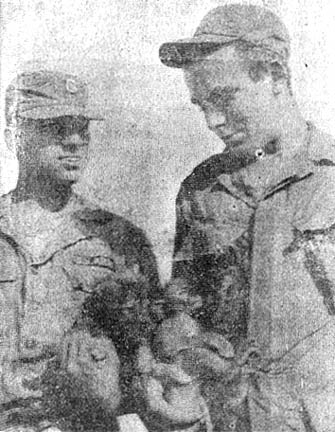 |
Aw, Quit Needling Me!
Panzer was restless. And so were Boom Boom, Lurch, Booby, Axel Rod, Sloopy,
Sandy and Mule. A couple of them were a little jumpy.
For five days they had waited, tossed in their sleep, skipped meals and paced
around nervously.
Most of them, however, finally accepted the fact that shots were coming and
might even help them keep well, but now they just wanted to get it over with and
the doctor was late.
Dr. Marian Ray, chief veterinarian for the 4th Medical Detachment in Saigon,
was an hour late last week for his scheduled appearance at division headquarters
and his patients waited with reservation for his arrival.
His patients, ranging from dogs to monkeys acquired by "Tropic Lightning"
soldiers to make life seem more like home, were a motley sight, gathered in
small groups around the admissions and disposition tent of the 25th Medical
Battalion, waiting for rabies shots.
Lurch began running after another dog. And Sandy joined. So did Booby and
Axel Rod. And Sloopy hung on.
Tigi, a five-pound monkey, purchased for 500 piastres ($4.24) in a nearby
village by Specialist Four Stuart Allison, of the 65th Engineer Battalion, ran
into a little trouble when she decided to pick a fight with 40-pound Boom Boom,
a husky dog also a member of the 65th Engineers.
One dog, who certainly wasn't going to get lost, wore the GI dog tag of its
owner, a status symbol among other canines who were issued nothing until the
real dog tags arrived later.
The animals, quite tired by now, went through the shot line with hardly. a
whimper. As each left, the veterinarian assured each owner that their bark
would be more dangerous than their bite.
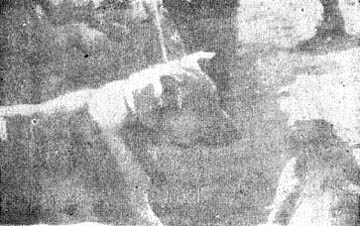 |
Boom Boom, a 40-pound dog, gives the evil eye to Tigi, a five-pound spider monkey, during a little horse play prior to inoculation ceremony at Cu Chi recently. The animals, belonging to 2nd Brigade, received rabies shots. |
WATER FIGHT AT PLEIKU WELL
All's well that ends well - between 30 and 50 feet down and eight feet in
diameter. Just ask the men of Company B, 2nd Battalion, 35th Infantry at Pleiku.
They'll tell you.
They'll also tell you that they were far from all wet when they decided to
become the division's only company-sized unit to have its own well.
After the company became situated at the "Broncos" base camp, they soon found
that it was no swimming party to come in from a long, hot day and discover dry
shower heads sneering at them in the shower point.
So Staff Sergeant Raymond D. Schablik, whose wife resides at Schofield
Barracks, and Corporal Donald L. Maxwell, of Summer, Wash., got their collective
divining rods together and decided digging was the only answer.
Streaming over to see Lieutenant Colonel George A. Scott, "Cacti Blue"
battalion commander, the two got quick approval for their proposed idea and the
project was on.
"We made a map study of the surrounding streams and came to the conclusion
that we could hit the water table at between 30 and 50 feet," Sgt. Schablik
said.
Then the picks and shovels were pulled from boxes and a six-man crew began to
dig a hole eight feet across with an end that may as well have been bottomless.
Periodically, they came across shelves of hard dirt containing
moisture. "Sometimes you could even squeeze the water out of some of it with
your hands," Sgt. Schablik remarked. It was enough to keep the picks and
shovels swinging with gusto.
But, as with many undertakings in taming Vietnam, the project was still
unfinished when water began gushing into the well.
Next a pump was needed to get the water into storage drums. Even that
problem was solved when the company pooled resources and purchased an electric
pump, which arrived last week.
"Now all we need is electricity to run the pump," Sgt, Schablik said. To the
rescue will be the brigade's repair and utilities unit, which is scheduled to
install a 100 kilowatt generator.
...And One at Cu Chi
A new well, producing nearly 30,000 gallons of water a day, has been dug at
Cu Chi to replace a similar water supply which was contaminated when heavy rains
collapsed the well sides.
Standing 30 yards from the unusable well, the new 20-foot-deep excavation was
reinforced with a 48-inch galvanized culvert well casing to prevent like
collapses and contamination.
The well will service two showers and quartermaster laundry with a water flow
of 40 gallons a minute.
Members of the 65th Engineer Battalion, who did the work on both wells, claim
the new one will remain an adequate source of water indefinitely unless Cu Chi
is struck by extreme drought.
Nowhere to Run
Rope-Wielding CWO Hog Ties V.C.
Captive
In a swampy area just west of Cu Chi, Chief Warrant Officer Claude Webber, of
Columbus, Ga., squinted at the ground from the UH1D helicopter he was piloting.
Below, a suspected Viet Cong cowered in a bush, trying to escape detection.
Being a member of the bring-em-back-alive school, CWO Webber, along with his
co-pilot, Chief Warrant Officer Clayton McLaughlin,of Kalispell, Mont., both of
the 197th Aviation Company, waited. When the suspect rose from the bush, they
raced toward him as the frightened VC attempted to escape.
Circling around overhead, CWO Webber told his crew chief and gunner not to
fire on the suspected enemy.
The Viet Cong, unaccustomed to Western roping techniques, hesitated as Webber
set down the chopper right in front of the corralled suspect, Gunner PFC Louis
Soward, of Covington, Ky., jumped out and nabbed his prey. Literally hog-tying
the VC, Soward hauled his catch aboard.
Claude Webber has spent 18 months in Vietnam, where be has logged more than
1,200 combat hours. When asked why he didn't fire at the suspect, he replied,
"They're worth more alive than dead for the intelligence information you can get
from them."
Having similarly roped more than one VC, Mr. Webber shrugged it off as just
another routine mission.
|
Class E and Class L allotments: |
"Dustoff": Angels of Mercy
They go by the code name "Dustoff." They are the flying ambulances whose
speed and response have carried thousands of wounded Americans from jungle
battlegrounds to field hospitals in Vietnam.
Two of these "angels of mercy" supported the 3rd Brigade in the recently
concluded operations Garfield and Lincoln.
The Dustoff choppers were ready to go at any hour to assist any element of
the brigade.
Captain Ronald F. Hopkins, 2nd Platoon. 498th Medical Company (Air
Ambulance), was the pilot of one of the two ships. He and his crew of four,
usually based with the rest of the 2nd Platoon near Pieiku, were on call 24
hours a day in the brigade's field hospital. It was there that the requests for
medical evacuation came on either the command radio network or the special
dustoff network.
The radio operator would jot down the necessary information, and as the last
of the data were coming in, Capt. Hopkins was already warming up his chopper.
More often than not, Dustoff will respond to a call even when conditions are
at their worst. Frequently the calls for help come at the height of a firefight
with the communists.
Capt. Hopkins said, "Sometimes we feel that the VC are aiming directly at the
big red cross on the side of our choppers, but they're probably shooting at any
helicopter they see. At any rate, they do not respect the red cross at all."
Once the casualties have been recovered, it is Dustoff's job to get them to a
medical facility - fast.
Seriously wounded are frequently evacuated directly to a complete medical
facility, such as 8th Field Hospital in Nha Trang.
Less serious casualties are taken to the 3rd Bde. hospital at the forward
command post. As the Dustoff 'copter approaches the CP, Capt. Hopkins radios
the hospital to report on the number and condition of the wounded.
By the time the chopper touches down, ambulances and attendants are waiting
to take the casualties to the hospital.
It's often a long day for the Dustoff crews. They know the job they are
doing is a vital one. It is with nothing but admiration that the "Tropic
Lightning" soldiers look at the men who "dust off."
Page 4 TROPIC LIGHTNING NEWS April 22, 1966
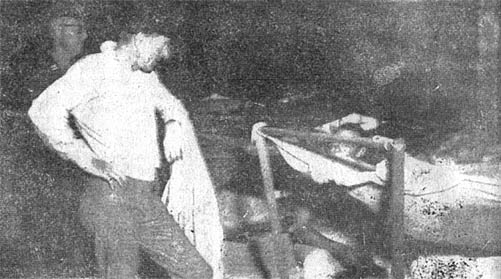 |
Danny Kaye talks with some of the wounded soldiers at the division field hospital. |
| Lori Bigley, of the Jim Drury Show, does the watusi with Sp4 Ronald Swift, 25th Administration Company. |
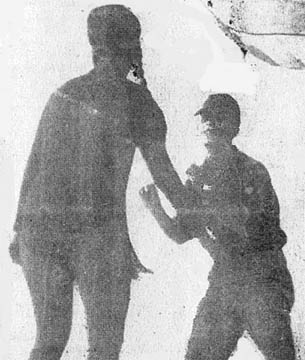 |
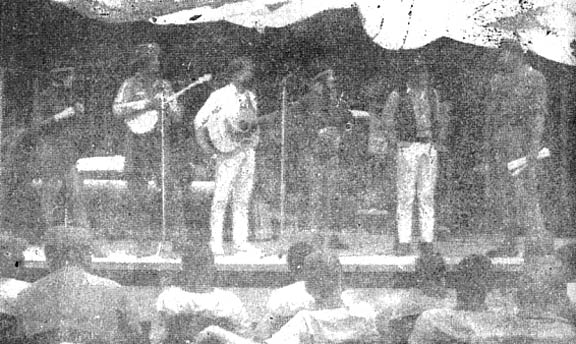 |
Members of the Jim Drury troop are awarded honorary memberships in the 25th Inf. Div. during their Cu Chi visit last week. |
| The Jim Drury Show on stage at Lightning Theater at Cu Chi. From left: Jani Lyman, Jon Locke, Lee Burch, Jim Drury and Lori Bigley. |
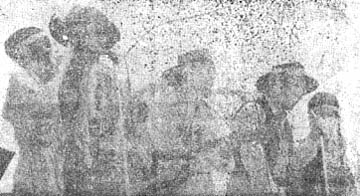 |
Never-Ending Search Goes On
By PFC John Dittmann
Thousands of years of warfare and virtually hundreds of thousands of tactical
and technical innovations have not yet changed the one, basic fact that the
infantryman, the foot soldier, the man with the burning bunions, is still the
ultimate weapon.
The time is now, here, in Vietnam. My job was to become part of operation
Makaha.
At 6:00 a.m., I joined the third platoon of B Company, 1st Battalion, 27th
Infantry, commanded by 2nd Lieutenant G. K. Wood. We were assigned to the third
wave of a three-wave heliborne assault of operation "Makaha." The landing zone
was an area of rice paddies and small hamlets 25 miles north of Saigon. The
Viet Cong had staged a number of ambushes in this area over the past several
days. It was now our turn to turn the tables.
When we lauded, the first two waves had already been under light sniper fire
for about half an hour but no real contact had been made. As the chopper
touched down, the men leapt out of both sides and dived for cover behind dikes
and bushes as if helicopter landings were second nature. As if the wave of an
arm were a switch that set them in motion, they moved out in unison to the next
dike.
There was sniper fire on our right. Suddenly a bullet whizzed past and I
dived for the nearest ditch. I landed on top of a private and he said, "Are you
all right, Sir?" When I said I was not a sir, he told me that I was.
Two more shots from the sniper were answered by the pop of M-16 rifles on
both sides. Then all was quiet, so we stood up - very slowly. My ditch partner
was covered with mud from his knees down; I was caked with it from my knees up.
The platoon moved through a heavily wooded area and then across 400 yards of
open fields. By now the heat of the Vietnamese sun was beginning to show in the
streaks of sweat that crisscrossed the men's shirts.
As we approached, there was more sniper fire. This time I landed on top of a
sergeant but he wasn't anywhere near as nice as the private.
The fire up ahead was getting heavy so we moved up to have a look. The
plodding foot soldiers of a few minutes ago were moving nimbly from building to
building.
I watched a sergeant, as, with cat-like ease, he slid along the side of a
house, kicked open the door and twisted into a position covering the entire
room. Nothing.
It was quiet on the street now. I followed Staff Sergeant Alfred Batungbacal,
a 125th Signal Battalion photographer, out into the street. As we walked toward
a machine gunner kneeling behind a stone marker, a shot cracked and a bullet
ricocheted just in front of us. This time I was in the hole first. Sergeant
Batungbacal, although laden with heavy equipment, followed amazingly quickly.
"Hey, you mind if I rest this camera on your back while I take this shot?" he
asked casually.
This time it looked like we might have something. The platoon, now in
positions on both sides of the street, cut loose with withering rifle and
automatic weapons fire. Still the bullets were coming our way. Someone
launched a rifle grenade froth the left and it was all over. Silence.
All afternoon we pushed from hamlet to hamlet, searching for "the enemy" but
found nothing but women and children and an occasional young man who, for some
reason, had not run off to hide.
While the men were being interrogated by the interpreter, someone spotted
some blood on the ground, possibly from a wounded VC. He called for Lt. Wood
and together they followed the trail.
In the back room of a house nearby they found a woman and her two children.
All three had been wounded by a Viet Cong mine that had been intended for us.
Lt. Wood called for a medic to give first aid. A doctor would be following
close behind with the mechanized units.
For the rest of the afternoon we followed the same pattern of search and
destroy, doing a lot of searching and finding little to destroy.
At five o'clock we pulled up to another hamlet where we dug in for the
night. Now it was the routine of finding a place to sleep, setting out a
perimeter guard, establishing communications and the hundred and one other
little things that must be done before settling for the night.
I grabbed the first resupply helicopter back to Cu Chi, leaving the foot
sloggers to spend the night on the ground. Tomorrow they would have more of the
same. They would make a house to house search of the six mile walk back to Cu
Chi. They would walk the same tired miles, drink the same hot water, eat the,
same cold food and choke on the same dry dust as they had today.
The ultimate weapon.
Thanks to:
The 25th Infantry Division Museum for providing the volume of 1966 Tropic
Lightning News,
Ron Leonard, 25th Aviation Battalion for finding and mailing them,
Kirk Ramsey, 2nd Bn., 14th Inf. for creating this page.
This page last modified 08-14-2006
©2006 25th Infantry Division Association. All rights reserved.